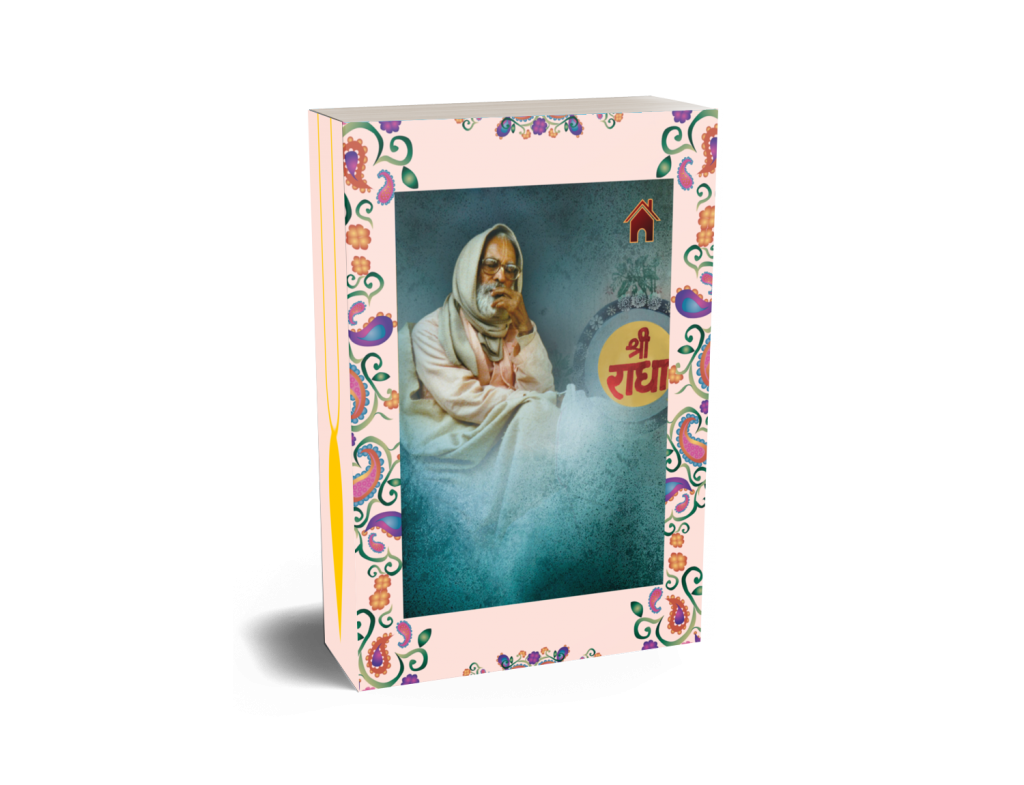

Chapter 10 from the book, Going Beyond Vaikuṇṭha, 4th edition by Śrīla Bhaktivedānta Nārāyaṇa Mahārāja
Sometimes it happens that a sādhaka cannot understand his own heart. Just as a patient cannot identify his own  disease, a sādhaka, due to his own weaknesses and shortcomings, cannot understand the nature of his own devotional sentiment. But a qualified doctor, by taking the pulse and seeing other symptoms, can understand those things which the patient himself cannot know. He will find the root cause of the disease. Where there is a fever, the doctor will not give any medicine for the fever itself, but instead he will give medicine for the cause of the fever. An ordinary man cannot act as such a doctor. Only someone with experience is the right person. Similarly, in our bhajana we may be unhappy – such misfortune may come to us. Those whose very life is bhajana can reveal to us what are our weaknesses and anarthas and from where they have arisen. They will give us a plan for eliminating those problems at the very root. They will say, “You must hear hari-kathā! And before hearing hari-kathā, you must serve the spiritual master with great faith.” And if we respond, “But in trying to serve, my mind is very restless. How will I control it?”, they will say, “Be confident – by the guru’s grace you will control it!”
disease, a sādhaka, due to his own weaknesses and shortcomings, cannot understand the nature of his own devotional sentiment. But a qualified doctor, by taking the pulse and seeing other symptoms, can understand those things which the patient himself cannot know. He will find the root cause of the disease. Where there is a fever, the doctor will not give any medicine for the fever itself, but instead he will give medicine for the cause of the fever. An ordinary man cannot act as such a doctor. Only someone with experience is the right person. Similarly, in our bhajana we may be unhappy – such misfortune may come to us. Those whose very life is bhajana can reveal to us what are our weaknesses and anarthas and from where they have arisen. They will give us a plan for eliminating those problems at the very root. They will say, “You must hear hari-kathā! And before hearing hari-kathā, you must serve the spiritual master with great faith.” And if we respond, “But in trying to serve, my mind is very restless. How will I control it?”, they will say, “Be confident – by the guru’s grace you will control it!”
The clever, intelligent guru understands the feelings in the heart of a disciple that even the disciple himself doesn’t understand. Gopa-kumāra wants to ask, “Why is it that my heart is not satisfied here, even though I know that there is no greater place?” But due to shyness, he cannot ask.
Nārada, the crown jewel of spiritual doctors, recognised the symptoms, identified the disease and, without even inquiring anything from Gopa-kumāra, will give the answer. He will give different levels of answers, understanding that what Gopa-kumāra is saying may be irrelevant to the actual root cause of the disease itself. So he will tell him some things that are valuable for sādhana, and some things for siddha, the level of perfection. If we don’t give the instructions that we hear from an experienced soul a place in our hearts and don’t follow them, then not only in one or two births, but in countless millions of births we will not attain hari-bhakti. Understanding the inner feelings of Gopa-kumāra and knowing the reason for his unhappiness, Nārada is telling us how we should engage in bhajana. Therefore we must first prepare our minds to accept his line of thought. The defects that Nārada will point out to Gopa-kumāra are actually within us, and when we make a sincere effort to eliminate these defects, then we will really be engaging in bhajana. You can take it that real bhajana will be coming soon.
vaikuṇṭha-vāsino hy ete
kecid vai nitya-pārṣadāḥ
pare kṛṣṇasya kṛpayā
sādhayitvemam āgatāḥ
Bṛhad-bhāgavatāmṛta (2.4.194)
Some of the residents of Vaikuṇṭha are nitya-siddha, and some are sādhana-siddha. The nitya-siddhas are the 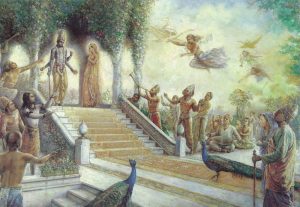 eternal associates, and the sādhana-siddhas are those who came later, who by the mercy of Bhagavān attained perfection by the practice of sādhana. In the service of all devotees there is gradation. Some remain near to Bhagavān serving Him with the cāmara, while others are far away carrying out orders. For instance, Vasiṣṭha Ṛṣi is serving Rāmacandra in Ayodhyā, and his service is saying, “maṅgalaṁ bhavatu” and giving blessings. He gives advice on different things such as how to perform sacrifices and so on. Lakṣmaṇa also performs different services for Rāma. Once, when Rāma was away, Lakṣmaṇa sat with Niṣādarāja and sang the glories of Rāma for the entire night. In great happiness Niṣādarāja experienced ecstatic symptoms of love. Day and night Lakṣmaṇa serves Rāma, and Hanumān also serves Him, but when Sītā serves Him, then everyone else is sent outside, and they will all follow her order. In such services there is always gradation.
eternal associates, and the sādhana-siddhas are those who came later, who by the mercy of Bhagavān attained perfection by the practice of sādhana. In the service of all devotees there is gradation. Some remain near to Bhagavān serving Him with the cāmara, while others are far away carrying out orders. For instance, Vasiṣṭha Ṛṣi is serving Rāmacandra in Ayodhyā, and his service is saying, “maṅgalaṁ bhavatu” and giving blessings. He gives advice on different things such as how to perform sacrifices and so on. Lakṣmaṇa also performs different services for Rāma. Once, when Rāma was away, Lakṣmaṇa sat with Niṣādarāja and sang the glories of Rāma for the entire night. In great happiness Niṣādarāja experienced ecstatic symptoms of love. Day and night Lakṣmaṇa serves Rāma, and Hanumān also serves Him, but when Sītā serves Him, then everyone else is sent outside, and they will all follow her order. In such services there is always gradation.
When trying to understand the reason for this gradation, one should not pass judgement by thinking, “This service is the highest, this service is lower.” In Vaikuṇṭha all of the servants have their uniqueness. For example, cooking is being done there also. With great love, Rāma’s mother Kauśalyā, Lakṣmaṇa’s wife Urmilā and Sītā-devī are all cooking for Rāma. Are they considered mere cooks? No. Cooking is also arcana, so don’t consider what is higher and lower in regard to sevā. To think “I am important” and that someone else is “just a cook” is aparādha. There is always gradation in service, but in all of it there is prema. Maybe in one particular form of bhajana there is more prema, and in another there is less, but when you arrive in Vaikuṇṭha, you’ll find that everyone’s service is extraordinary, and their prema is also extraordinary. We should understand this point. Therefore, there is no inferiority there, only gradation and speciality.
Hanumān, Jāmbavān, Sugrīva, Aṅgada and all others came together for the royal coronation of Rāmacandra. With great love Rāma had accepted all of their services and then began bidding them farewell. He called Sugrīva and placed a beautiful garland of jewels around his neck. Rāma embraced him and said, “I am indebted to you. If not for you, if you hadn’t gone searching for Sītā, then we wouldn’t have ultimately been victorious. Therefore remain in the kingdom and enjoy the fruits of your service. Sometimes I will call for you to come and see Me, or I will come to you Myself.”
While Rāma was bidding them farewell, there were tears in the eyes of everyone. He called them one by one, and meeting with them, He gave cloth to some, to others He gave ornaments, and to others He gave something else. But where had Aṅgada hidden? Why had he hidden? He was thinking, “When He calls me, then I will have to go. But I don’t want to leave Him!”
Rāma bid farewell to all, and Aṅgada remained hidden. Then Rāma said, where has Aṅgada gone?” He was  hiding behind Hanumān, because he knew that Rāma wouldn’t call Hanumān to bid him farewell. Rāma had called everyone else; so why didn’t He call Hanumān? The reason was that in the home of Sugrīva there was a wife and there were children, so Rāma told Sugrīva, “Now you must return to them.” Aṅgada had his mother, but Hanumān had left everything. All others had their objects of love, and together with that they had bhakti for Rāma also. Everyone had other points of affection, but Hanumān had no other point of affection. His only object of service was the feet of Rāma. He didn’t even have his own hut! All others had their family, or their kingdom, or their building, or their position in society. Jāmbavān had his cave in Vindhyācala mountain, so Rāma told him, “Go, please… your wife is there.” But if He said to Hanumān, “You go,” then Hanumān would say, “My Lord, where will I go? I have not made a hut anywhere. You are my mother and my father also – You are my everything! Your feet are my only residence. I have nothing else besides You.”
hiding behind Hanumān, because he knew that Rāma wouldn’t call Hanumān to bid him farewell. Rāma had called everyone else; so why didn’t He call Hanumān? The reason was that in the home of Sugrīva there was a wife and there were children, so Rāma told Sugrīva, “Now you must return to them.” Aṅgada had his mother, but Hanumān had left everything. All others had their objects of love, and together with that they had bhakti for Rāma also. Everyone had other points of affection, but Hanumān had no other point of affection. His only object of service was the feet of Rāma. He didn’t even have his own hut! All others had their family, or their kingdom, or their building, or their position in society. Jāmbavān had his cave in Vindhyācala mountain, so Rāma told him, “Go, please… your wife is there.” But if He said to Hanumān, “You go,” then Hanumān would say, “My Lord, where will I go? I have not made a hut anywhere. You are my mother and my father also – You are my everything! Your feet are my only residence. I have nothing else besides You.”
Rāmacandra saw that Hanumān was akiñcana, possessionless, whereas all the others were not. So as long as there is another point of affection besides Kṛṣṇa in our bhajana, then He will say, “All right, you go,” and send us back to the place from which we have come. He sent back the wives of the brāhmaṇas who had their homes, husbands and children. But although some of the gopīs had husbands and even children, upon meeting Kṛṣṇa their attachment for them was washed away from their hearts forever. As long as we remain akiñcana, there will be no attachment to a mother or anyone else, and we will not be ordered to return.
bhajanānanda-sāmye ’pi
bhedaḥ kaścit prakalpyate
bāhyāntarīṇa-bhāvena
dūra-pārśva-sthatādinā
Bṛhad-bhāgavatāmṛta (2.4.195)
The bhajanānanda, the happiness derived from serving Bhagavān, is the same for all of His eternal associates, but some consider that there is a difference between serving Him from a position near to Him, and serving Him from a distance.
When a kaniṣṭha-adhikārī devotee engages in bhajana, he thinks, “There is no one like me. I am getting so much  happiness from my bhajana. I am so impressive.” Another man who is playing mṛdaṅga is thinking, “I am playing the mṛdaṅga in so many ways and a very beautiful melody is coming. I am playing so nicely.” The karatāla player is also thinking in this way, and the man who is singing is feeling that there is great happiness in all of this. But when there will be some consideration of gradation, then we will understand that simply playing the mṛdaṅga and karatālas nicely does not constitute genuine kīrtana. Why do we play the karatālas? Day and night a party may be continuously playing golden, polished karatālas and mṛdaṅgas very, very nicely, while in another place there is one man alone, who without mṛdaṅga or karatālas is sitting and chanting:
happiness from my bhajana. I am so impressive.” Another man who is playing mṛdaṅga is thinking, “I am playing the mṛdaṅga in so many ways and a very beautiful melody is coming. I am playing so nicely.” The karatāla player is also thinking in this way, and the man who is singing is feeling that there is great happiness in all of this. But when there will be some consideration of gradation, then we will understand that simply playing the mṛdaṅga and karatālas nicely does not constitute genuine kīrtana. Why do we play the karatālas? Day and night a party may be continuously playing golden, polished karatālas and mṛdaṅgas very, very nicely, while in another place there is one man alone, who without mṛdaṅga or karatālas is sitting and chanting:
gurudeva kṛpā-bindu diyā, kara’ ei dāse
tṛnāpekṣā ati hīna
sakala sahane, bala diyā kara’
nija-māne spṛhā-hīna
sakale sammāna, karite śakati
deha’ nātha yathāyatha
tabe ta’ gāiba, hari-nāma-sukhe
aparādha ha’be hata
Śaraṇāgati (Bhajana-lālasā 11)
O Gurudeva, please give this servant of yours a drop of your mercy, which will make him realise that he is more insignificant than a piece of straw. Give me the strength to tolerate all difficulties, and please make me devoid of all desires for personal prestige. Only when you have given me the ability to properly respect all living beings will all my offences cease, and I will be able to sing the holy name in great happiness.
With great feeling he is singing it, with his bodily limbs shivering and tears flowing from his eyes. So between the  happiness of all those mṛdaṅga and karatāla players and that of the one lone man performing kīrtana with such feeling, will there be some distinction? Very much so. The lone man’s chanting is really kīrtana. And that ‘kīrtana’ that has very beautiful mṛdaṅga notes, a beautiful melody, and has everyone involved in it, but is devoid of even a little genuine devotion, is something else entirely. Therefore in kīrtana, sincere sentiment is necessary, and just as in bhajana there is gradation, in arcana there is also gradation. One man is offering arcana with a pure sentiment, one man is offering arcana without any such sentiment, and another man who blasphemes Vaiṣṇavas is also offering arcana to the deity. Will it all be equal? No.
happiness of all those mṛdaṅga and karatāla players and that of the one lone man performing kīrtana with such feeling, will there be some distinction? Very much so. The lone man’s chanting is really kīrtana. And that ‘kīrtana’ that has very beautiful mṛdaṅga notes, a beautiful melody, and has everyone involved in it, but is devoid of even a little genuine devotion, is something else entirely. Therefore in kīrtana, sincere sentiment is necessary, and just as in bhajana there is gradation, in arcana there is also gradation. One man is offering arcana with a pure sentiment, one man is offering arcana without any such sentiment, and another man who blasphemes Vaiṣṇavas is also offering arcana to the deity. Will it all be equal? No.
In the spiritual realm also there is gradation in the service of the eternal associates of Bhagavān. Just as one servant brings flowers, another makes a garland, another hands the garland to Lakṣmī-devī, another prepares food and another offers it. In this way there is gradation. One is serving near to Him, and others are serving from farther away. If the one who is serving near to Him thinks that those who are serving from farther away are inferior, he is mistaken. The bhāva, or sentiment, is the important thing.
Caitanya Mahāprabhu’s servant Govinda dāsa may think that Svarūpa Dāmodara and Rāya Rāmānanda are only servants who remain at a distance from the Lord, and who only come for a few minutes or an hour and make Mahāprabhu cry. Govinda dāsa himself wipes away the tears of Mahāprabhu, and then they come and make Him cry again. So he may think, “Why do they have to come and make Him cry again?”
Govinda dāsa is always saying to the Lord, “Prabhu, please don’t cry.” Then Svarūpa Dāmodara will come and make Him cry again, so what will Govinda dāsa think? Therefore it is not that the servant who is nearer is necessarily better. In this case the servants that remained farther away from Mahāprabhu are higher. It is not a question of the physical proximity or distance, but of the heart’s nearness to or distance from Him. That service to Hari, Guru and the Vaiṣṇavas in which there is the most love is the best.
When the four Kumāras arrived at Vaikuṇṭha, the gatekeepers there, Jaya and Vijaya, raised their sticks and 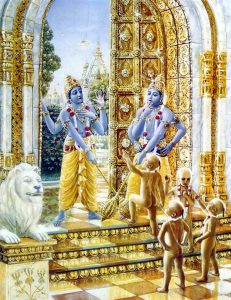 said, “You cannot enter!” Thinking that they were the masters there, they prohibited the four Kumāras from entering. Should those doormen have thought that since the Kumāras had come from a long distance they couldn’t have known that it was the time that the Lord takes rest? The Kumāras knew everything. They came in humility with folded hands, but they knew everything. Jaya and Vijaya didn’t understand the feelings and the prema that the Kumāras have for Bhagavān. Is it like this only sometimes? Most of the time it is like this! One who is serving near to the Lord or near to the spiritual master cannot understand the devotional sentiment of those who are serving at a distance. Therefore we should be careful not to think so highly of ourselves and we should always remember the ‘misfortune’ that came upon Jaya and Vijaya. We should understand how to behave properly and avoid being arrogant.
said, “You cannot enter!” Thinking that they were the masters there, they prohibited the four Kumāras from entering. Should those doormen have thought that since the Kumāras had come from a long distance they couldn’t have known that it was the time that the Lord takes rest? The Kumāras knew everything. They came in humility with folded hands, but they knew everything. Jaya and Vijaya didn’t understand the feelings and the prema that the Kumāras have for Bhagavān. Is it like this only sometimes? Most of the time it is like this! One who is serving near to the Lord or near to the spiritual master cannot understand the devotional sentiment of those who are serving at a distance. Therefore we should be careful not to think so highly of ourselves and we should always remember the ‘misfortune’ that came upon Jaya and Vijaya. We should understand how to behave properly and avoid being arrogant.
Generally these things are said for those practising sādhana, but even in the state of perfection this can happen. This incident occurred in Vaikuṇṭha, but it is for giving instruction to those of us performing sādhana. In any situation we should never have a mood of disrespect towards Vaiṣṇavas, nor should we ever speak ill of them.
Kṛṣṇa has so many eternal associates, and they all have their uniqueness. There are so many incarnations and sources of incarnations of Bhagavān, and They all have Their associates, but Kṛṣṇa’s associates are more special than them, more special than the devotees of Nṛsiṁha and all other incarnations. The devotees of other incarnations serve their Lord with humility and folded hands, but Kṛṣṇa’s devotees sometimes fight and quarrel with Him and display māna, jealous anger. Such a bhāva is found in their service, and therefore they are greater.
vadanti kecid bhagavān hi kṛṣṇaḥ
su-sac-cid-ānanda-ghanaika-mūrtiḥ
sa yat paraṁ brahma pare tu sarve
tat-pārṣadā brahmamayā vimuktāḥ
Bṛhad-bhāgavatāmṛta (2.4.200)
Some say that Kṛṣṇa and His many incarnations are all one in tattva, although there is some gradation and speciality in rasa and manifestation of potency. That is all right. In Their associates there is the same uniqueness, but will we take it that some of these associates are inferior? Don’t think in this way. Whether they are nitya-siddha or sādhana-siddha devotees, it says here that they are all fully, eternally liberated.
Some say that Kṛṣṇa is parabrahma, the supreme spiritual entity and that all of His eternal associates are brahma, spirit. In some places it has been stated like this, and this is also not incorrect. What is brahmānanda? The inherent blissfulness (ānanda) of the living entity is called brahmānanda. The jīva has been called brahma, but the jīva has not been referred to as parabrahma; parabrahma is Kṛṣṇa. We don’t consider that brahma and parabrahma are one and put them in the same class. We consider the jīva to be the servant: dāso ’smi dāso ’smi. The scriptures say “brahma evaṁ bhavati – one certainly becomes brahma”, in the Gītā there is “viśate tad anantaram – one then enters into that”, and there are also similar verses in Śrīmad-Bhāgavatam. In Purī, Sārvabhauma Bhaṭṭācārya came to have hatred for the theory of monism (brahmavāda), but not all liberation is worthy of hatred. Mukti can also mean attaining service at the feet of Bhagavān. But Sārvabhauma despised the word mukti, and he also despised referring to the jīva as brahma.
Hearing this line of thought, Gopa-kumāra asked Nārada a question:
pṛṣṭaṁ mayedaṁ bhagavan dharā-tale
tiṣṭhanti yāḥ śrī-pratimā mahā-prabhoḥ
tāḥ sac-cid-ānanda-ghanās tvayā matā
nīlādri-nāthaḥ puruṣottamo yathā
eko ’pi bhagavān sāndra-
sac-cid-ānanda-vigrahaḥ
kṛpayā tatra tatrāste
tat-tad-rūpeṇa līlayā
Bṛhad-bhāgavatāmṛta (2.4.202–3)
In this world, there are many deities of Bhagavān. In Purī there are Jagannātha, Baladeva and Subhadrā, in Śrī 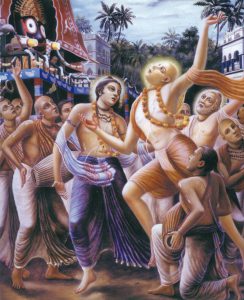 Raṅgam there is Raṅganātha, and in those places They are being worshipped. There, whether the prasāda is cooked or uncooked, its acceptability is not considered. Those deities are established there to mercifully give darśana to the people of this world. Gopa-kumāra asked, “There are so many forms of Bhagavān in this world, like Jagannātha and Raṅganātha, and many other deities. In what way should we respect Them? Are They all solidified forms of sac-cid-ānanda? By offering pūjā to any of Them, will it be considered offering pūjā to Bhagavān?”
Raṅgam there is Raṅganātha, and in those places They are being worshipped. There, whether the prasāda is cooked or uncooked, its acceptability is not considered. Those deities are established there to mercifully give darśana to the people of this world. Gopa-kumāra asked, “There are so many forms of Bhagavān in this world, like Jagannātha and Raṅganātha, and many other deities. In what way should we respect Them? Are They all solidified forms of sac-cid-ānanda? By offering pūjā to any of Them, will it be considered offering pūjā to Bhagavān?”
There are so many deities in this world, and all are sac-cid-ānanda. For showing mercy to the devotees, the one Bhagavān is situated in many different forms as His pastime. But we are not able to serve Him directly. If we try to serve Him just as Lakṣmī-devī is serving Nārāyaṇa, as the gopīs are serving Kṛṣṇa, and as Prahlāda Mahārāja is serving Nṛsiṁhadeva, at some point we will say, “O Lord, the time to take rest has long passed. For half the night I remained without sleep. I am feeling very sleepy.” So Bhagavān will say, “Then you go and sleep,” and we will have to go and take rest. If the deity were to speak and express His desire – “Massage My feet. This food has not been prepared properly; make it like this” – we would become easily discouraged.
We want to serve according to our own desire. If we have not even served according to the desire of our guru – if we could not follow him properly – then how will we serve Bhagavān directly? If we are placed directly in front of Bhagavān and He says, “Do this service for Me!”, can we do it? Could we do anything and everything He asked of us at any time? We are not able to. Therefore the deity remains silent. However many services we offer, He just remains silent. So Bhagavān has assumed all these forms for giving mercy to the devotees. He understands that by no other means will we be able to serve Him in our conditioned state, so He becomes the deity form, remains silent, and in the end He just accepts our obeisances. For this reason He has manifested these deities.
There are many different types of ruci in the living entities, so to accept service from them according to their ruci,  He has assumed different forms. Some will serve in dāsya-rasa, some in sakhya and some in vātsalya. Why has Kṛṣṇa become Laḍḍū-Gopāla? Because then many people can worship Him as their son. When women become old and their offspring have all grown up, they still desire to render the service of a parent. Women are so inclined toward serving children that not only will they forget about serving their husbands, they will even engage the husband in the service of the children! The wife will say to her husband, “Help me a little with the children. Catch that child! Bring some milk for the children. The children are sick, call the doctor for them. Take the children to school!” The sentiment of serving children is vātsalya-bhāva, so for them Kṛṣṇa has become Bāla-Gopāla, for others He becomes something else, but all these deities are eternal. To accept service Kṛṣṇa has become the deity and assumed many forms, and He doesn’t speak. If He spoke, then we couldn’t serve Him. At one, two, or three o’clock in the night He may feel cold and require some service when His servant is in deep sleep. So what would happen if He always expressed His desire? Therefore He remains silent and accepts our service.
He has assumed different forms. Some will serve in dāsya-rasa, some in sakhya and some in vātsalya. Why has Kṛṣṇa become Laḍḍū-Gopāla? Because then many people can worship Him as their son. When women become old and their offspring have all grown up, they still desire to render the service of a parent. Women are so inclined toward serving children that not only will they forget about serving their husbands, they will even engage the husband in the service of the children! The wife will say to her husband, “Help me a little with the children. Catch that child! Bring some milk for the children. The children are sick, call the doctor for them. Take the children to school!” The sentiment of serving children is vātsalya-bhāva, so for them Kṛṣṇa has become Bāla-Gopāla, for others He becomes something else, but all these deities are eternal. To accept service Kṛṣṇa has become the deity and assumed many forms, and He doesn’t speak. If He spoke, then we couldn’t serve Him. At one, two, or three o’clock in the night He may feel cold and require some service when His servant is in deep sleep. So what would happen if He always expressed His desire? Therefore He remains silent and accepts our service.
But if we suppose that He says nothing because He knows nothing, that is an offence. He doesn’t speak or move, but we should understand that He sees everything. He knows the true scope of what we do, and we must accept the reaction to whatever we do. Therefore in front of the deity we shouldn’t spread our legs, talk too much, become angry at anyone, or inordinately display affection for anyone. Before the deity don’t offer obeisances to anyone and don’t speak too loudly. All these things should be given careful attention. If in the deity’s room there is fighting and arguing, and the pujārī goes to do the pūjā with an agitated mind, that will be an offence. With a disturbed mind we should not do the deity’s pūjā. But He remains silent anyway. We take it that He sees nothing, but He is very merciful and sometimes doesn’t even accept the offences of His devotees.
Those who leave other types of sādhana to perform arcana of the deity will benefit. But Gopa-kumāra is saying to Nārada, the very founder of pūjā, “Prabhu, in some places in the scriptures it is written that there are some who are offering arcana to the deity, but are disrespecting devotees.”
arcāyām eva haraye
pūjāṁ yaḥ śraddhayehate
na tad-bhakteṣu cānyeṣu
sa bhaktaḥ prākṛtaḥ smṛtaḥ
Śrīmad-Bhāgavatam (11.2.47)
A devotee who worships the deity in the temple with faith but does not properly respect other devotees or people in general is called a materialistic devotee and is included within the lowest class of devotees.
yo māṁ sarveṣu bhūteṣu
santam ātmānam īśvaram
hitvārcāṁ bhajate mauḍhyād
bhasmany eva juhoti saḥ
Śrīmad-Bhāgavatam (3.29.22)
One who worships the deity in the temple but does not know that Bhagavān in the form of the Supersoul is situated in every living entity’s heart is in ignorance and is compared to one who offers oblations of ghee onto ashes.
Kṛṣṇa is situated within each and every jīva. There is no soul where there is not Bhagavān. Yet in many  scriptures such as Nārada’s own bhakti-sūtra, the Nārada-pañcarātra, it is stated that there are people who worship the deity in the temple, but insult and disrespect other living entities and even blaspheme Vaiṣṇavas as they are carrying on their pūjā. Apparently they are very strict: if a mango has mistakenly been put in an unclean place, or if someone has seen it and desired to taste it, then they will throw that mango away and it won’t be offered to the deity. At the time of cooking, they cover their faces with cloth, and at the time of kneading dough, there will be no speaking. They honour all of these principles, but they disrespect devotees. They pass judgement on whether devotees are higher or lower, and thus it is written that the arcana that these people are offering to the deity is like the pouring of ghee onto ashes. And furthermore:
scriptures such as Nārada’s own bhakti-sūtra, the Nārada-pañcarātra, it is stated that there are people who worship the deity in the temple, but insult and disrespect other living entities and even blaspheme Vaiṣṇavas as they are carrying on their pūjā. Apparently they are very strict: if a mango has mistakenly been put in an unclean place, or if someone has seen it and desired to taste it, then they will throw that mango away and it won’t be offered to the deity. At the time of cooking, they cover their faces with cloth, and at the time of kneading dough, there will be no speaking. They honour all of these principles, but they disrespect devotees. They pass judgement on whether devotees are higher or lower, and thus it is written that the arcana that these people are offering to the deity is like the pouring of ghee onto ashes. And furthermore:
aham uccāvacair dravyaiḥ
kriyayotpannayānaghe
naiva tuṣye ’rcito ’rcāyāṁ
bhūta-grāmāvamāninaḥ
Śrīmad-Bhāgavatam (3.29.24)
[Kapiladeva said:] O sinless mother, even if someone worships the deity with all the proper rituals and various kinds of paraphernalia, I am never pleased by a person who is ignorant of My presence in all living entities.
All souls are the residence of Bhagavān. Especially here this instruction is being spoken for devotees. Those who perform exclusive bhajana of Bhagavān must not insult any living entity. We are insulting others, but so nicely we are performing arcana. Even if we are giving all respect to Vaiṣṇavas, still Bhagavān will not be satisfied; there will still be offences because respect is not being given to all souls. Pratimā-manda-buddhīnām: those of small intelligence are offering this type of arcana-pūjā. In another place it is also said:
arcye viṣṇau śilā-dhīr guruṣu nara-matir vaiṣṇave jāti-buddhir
viṣṇor vā vaiṣṇavānāṁ kali-mala-mathane pāda-tīrthe ‘mbu-buddhiḥ
There are those who consider that Bhagavān is in the deity. Yes, inside different things there is gradation in the degree of Bhagavān’s presence, but they don’t consider that the śilā is Bhagavān Himself. They also think that the Lord’s caraṇāmṛta, which dispels the influence of Kali-yuga, is ordinary water. And they further consider that the object of arcana, the deity, is sometimes composed of ‘second-number’ marble, whereas in another place there is a deity composed of first-class marble. They consider, “Oh, this deity at Govardhana is very beautiful, but the deities we see in the temples of Vṛndāvana are not this beautiful. Here, Kṛṣṇa’s nose is a little straighter, His eyes are a little longer, and this is very good.” Bhagavān does not accept pūjā from people who think like this.
They also consider the dust of the feet of Vaiṣṇavas to be ordinary dust, and the foot-water of the Vaiṣṇavas to 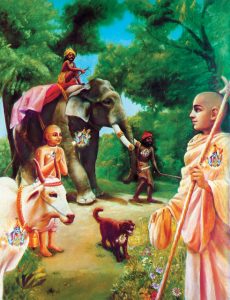 be ordinary water. They have faith in the holy places and the water there, but in the caraṇāmṛta of Vaiṣṇavas they don’t have the same faith. They place their faith in the skin and blood of the material body, which is destined to perish. The soul is inside every type of body, but they don’t understand that the ātmā is a dear part of Bhagavān. It doesn’t matter that the soul is bound within a material body; its intrinsic form is as a servant of Bhagavān. Therefore it should be respected. Respect is given on different levels, so we should give appropriate respect to all others. And what is the position of he who doesn’t do this? Sa eva go-kharaḥ (Śrīmad- Bhāgavatam 10.84.13). Go means ‘animal’ and kharaḥ means ‘donkey’. Don’t take it that here go means ‘cow’ – the cow is a very pure thing! It means such a person is no better than an animal, and the most foolish of the animals is the donkey.
be ordinary water. They have faith in the holy places and the water there, but in the caraṇāmṛta of Vaiṣṇavas they don’t have the same faith. They place their faith in the skin and blood of the material body, which is destined to perish. The soul is inside every type of body, but they don’t understand that the ātmā is a dear part of Bhagavān. It doesn’t matter that the soul is bound within a material body; its intrinsic form is as a servant of Bhagavān. Therefore it should be respected. Respect is given on different levels, so we should give appropriate respect to all others. And what is the position of he who doesn’t do this? Sa eva go-kharaḥ (Śrīmad- Bhāgavatam 10.84.13). Go means ‘animal’ and kharaḥ means ‘donkey’. Don’t take it that here go means ‘cow’ – the cow is a very pure thing! It means such a person is no better than an animal, and the most foolish of the animals is the donkey.
Gopa-kumāra is asking Nārada, “Prabhu, why has this been stated in the scriptures? Please explain this. Some of the deity worshippers have been referred to like this, but you said that those who perform arcana are the most fortunate. How can this be reconciled?”
An ordinary person cannot reconcile it, and even a lower-level madhyama-adhikārī devotee cannot reconcile it. Only an intermediate or higher-level madhyama-adhikārī who is conversant with the scriptures and who has attained the mercy of the spiritual master can grasp all of this. And because Nārada is the original founder of the path of pūjā and also the foremost preacher of that path, who could possibly know this science better than him?
Image/Art made possible by Pixabay.com & Krishnapath.org








